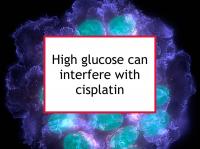Cisplatin chemotherapy has multifaceted interactions with blood sugar. Type 2 diabetes has been reported to impair the treatment efficacy of cisplatin, reducing its accumulation in tumors (as well as in organs not intended to receive treatment). Cisplatin resistance in triple negative (ER-/PR-/HER2-) breast cancer appears to be due partly to metabolic reprogramming of resistant cells, which become more dependent on glucose.
These findings suggest that poor glucose control could reduce the treatment effects of cisplatin. Now a new study has uncovered how high glucose promotes resistance to cisplatin in triple negative breast cancer cells and may increase their aggressiveness.
Latest research describes glucose - cisplatin mechanism of action
The study referenced above was designed to investigate the effects of high glucose on cisplatin sensitivity in triple negative breast cancer. Evidence to date indicates that diabetes-related elevations in blood sugar, insulin, and insulin‑like growth factor‑1 (IGF-1) promote breast cancer cell aggressiveness.
High glucose was defined as 30 mmol/l in the study, normal glucose as 5.6 mmol/l . To conduct the study, the authors assessed the effects of high glucose on cisplatin sensitivity and gene expression in MDA‑MB‑231 triple negative breast cancer cells. High glucose was found to reduce cisplatin cytotoxicity. At the same time, caspase‑3 activation declined, demonstrating that high glucose impaired apoptosis (programmed cell death).
The authors also analyzed genes that were differentially expressed in high glucose compared to normal glucose conditions. High glucose was found to alter the expression of genes involved in glucose, glycerophospholipid, purine and pyrimidine metabolism and to affect regulatory pathways such as Wnt/β‑catenin, p53 network, NF‑κB survival and DNA damage response.
Finally, the authors identified multiple genes potentially associated with high glucose‑induced chemoresistance. Some of these genes were associated with poor prognosis. In addition, several of the genes appeared to contribute to tumor aggressiveness. The authors conclude that high glucose levels appear to induce resistance to cisplatin and more aggressiveness in triple negative breast cancer cells through multiple metabolic and signaling pathways. The authors also note that the study identified biomarkers with potential prognostic and treatment relevance in diabetic breast cancer.
Please see our articles on cisplatin and type 2 diabetes for more information.
